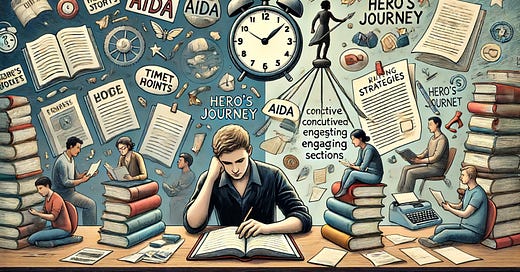Attention span is worse than ever. As a writer, you must have heard of “hooks”. If you don’t grab the attention of your reader with a hook, you’ll…
Well, the problem is that the average human attention span has decreased significantly over the past two decades, dropping from 12 seconds to just 8.25 seconds in four years. Considering that the average human reads 200 words per minute, that first paragraph could have been 40 words four years ago, but now it should be limited to 27 if you do the math without any criteria. And because of that, you don’t know the consequences of a hook now. Or I’m just not effective enough with my writing.
Do you see where this takes us?
Many writing gurus on the internet and the copywriting world will tell you to follow a formula. From the “hero’s journey” to AIDA (Attention-Interest-Desire-Action), a simple search will give you a million ways to try to control your reader’s attention and be effective with your writing.
You’ll find effective formulas, I’m not gonna lie. I tried them before and they work. But what bothers me is the obviousness of their uncreative use and how we’re letting them dominate our writing minds.
On the other hand, I do like the idea of creating templates for my writing to increase productivity and I’m becoming one of those readers who hates purple prose and wish some authors could have told their stories in fewer words.
So what do we do? Succumb to formulas?
While I do believe that for certain situations, writing formulas can save you time and energy, creativity should always lead the way.
Hooks are important. We have to start with an engaging opening, an intriguing question, a startling fact, a compelling anecdote, etc. The reader has to know why our words are worthy of their time.
But more than that, because of the attention span of our readers and ourselves we have to either keep it concise or respect our reader’s time if we decide to write in long form.
Respecting our reader’s time is actually the key here in both cases. Writing short or long, time is of the essence.
The decrease in attention span is not just a consequence of many habits but it’s also reshaping back some habits and people are getting less patient with spending too much time on something. So, we either have to provide the reader with an experience that is fast and effective, or one that is pleasant and interesting, while also worthy of the long time spent on it.
If you want to write something long, a few tips I know are:
Vary your pacing. Vary the rhythm of your writing. Mix short sentences with longer ones in a way you can keep the pace of your words more dynamic.
Don’t use words you don’t use every day. Instead, play with senses.. I know that calling the pleasant smell of a desired rain after a long period of dry weather “petrichor” is poetic and cool, but the emotions you elicit with the description with the words “pleasant”, “desired”, “long” and “dry” is so much better, and you don’t have to bother your reader with searching for the word “petrichor” in the dictionary.
Turn every block into a hook. Write as if each block is a new hook. Scenes, ideas, and topics… put them together like scenes and shots of a movie or a short video in a way your reader will always want to keep reading the next block. Here’s where other writing keywords might be useful. Keywords like cliffhanger, show don’t tell, foreshadowing, and layered narrative. Explore those devices.
Own those formulas, allow yourself to break them, and creatively mix them. Formulas are useful but don’t use them to check boxes like an automation. Rather, use them as guides to create your own roadmap.
When you finish, read what you wrote aloud, and check if you would like to read what you just wrote. If you feel like cutting parts and editing, go ahead and do it. If you wouldn’t like to read it, nobody will.
What do you say? What is your opinion on that?
TL;DR
Attention spans are shorter than ever—down to 8.25 seconds.
Hooks are crucial. Capture interest immediately.
Formulas like the “hero’s journey” or AIDA help, but can be overused.
Balance productivity and creativity.
Start strong: use questions, facts, anecdotes.
Respect reader’s time: be concise or make long reads worthwhile.
Tips for engaging long pieces:
Vary pacing: mix short and long sentences.
Use everyday language to evoke emotions.
Make every section a mini-hook.
Mix and break formulas creatively.
Read aloud and edit ruthlessly.
Key: Respect reader’s time and attention.





I really dislike how formulaic writing has become. I remember learning all the formulas for novel writing in high school, and watching my creativity erode as I tried to shoehorn everything I did into them. It was a disaster. Understanding the concepts that produce these formulas is valid and valuable to writing craft, but marrying yourself and your work to them is nothing but a ball and chain.